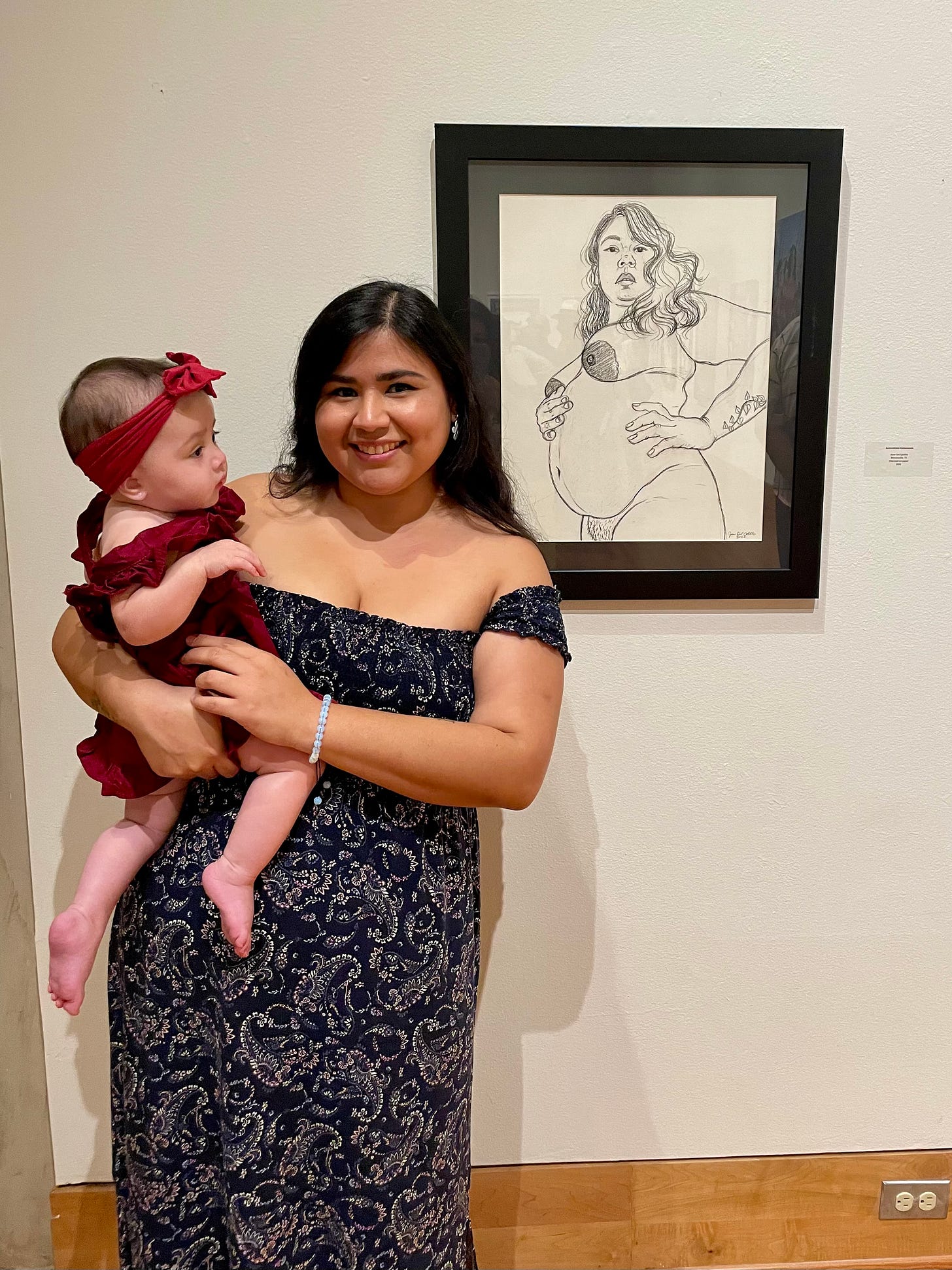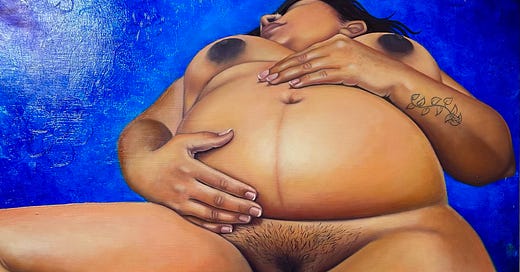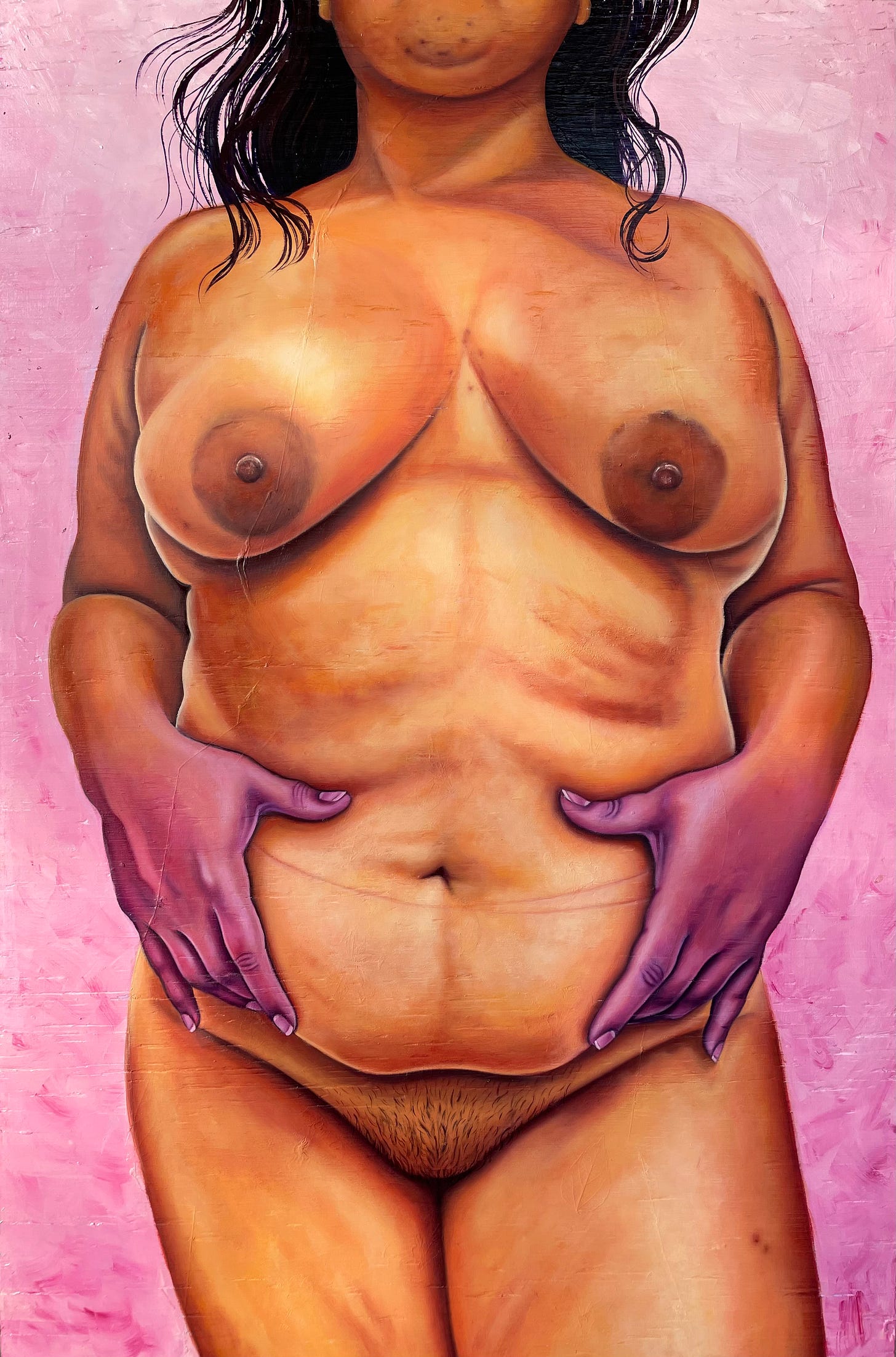Lose Yourself
Artist and mother Josie Del Castillo on creating art in a border town and beyond the patriarchal walls of motherhood.
Josie Del Castillo’s art is a nice fuck you to a patriarchal society that is historically known for its violence on women's bodies. She offers us, as witnesses, the opportunity to step outside of the bounds of the dreamy, sunshine-and-rainbows fantasy of pregnancy, motherhood, and the female body through her incredible work. And just like her artwork offers us a new way of perceiving a female body at full face value, her raw and honest depictions of loving her daughter while rejecting Motherhood as a way of life is also an opportunity. Through her work, Josie allows us to imagine and inhabit a different space between Mother and Self.
“I don’t want to be a mom, but I love my daughter.” Josie said during our conversation about how her artistic process has changed since becoming a mother. I wanted to take a moment to really break down what that means. Being labeled as a mom has been tainted with the burden of raising children in a society that does not honor what hard work it truly is, in a society that does not honor or care for its children the way it claims to. Mom: ever-changing landscape of endless parenting philosophies and guilt inducing right or wrong ways to do it. Mom. Mom: lose yourself. The title demands it and so do the chains of the patriarchal system.
What Josie means when she says she doesn’t like being a mom is not that the child she is raising and once carried in her womb is not wanted or loved but that the weight of the world’s expectations on her as a single mother are something that she actively rejects, the same way she has rejected the white supremacist beauty standards that denied her body its right to be deemed beautiful. This is one of the most badass women I have ever had the pleasure to speak with and I encourage everyone to follow her work.
Welcome to part one of our interview with Josie Del Castillo: Lose Yourself.

CHRISTIÁN PEÑA: What was it like growing up in a border town like Brownsville, Texas — I think you recently mentioned that as a kid you didn't really know the difference between the two countries?
JOSIE DEL CASTILLO: When you’re a kid you don’t really know anything there was no difference between the two. As I got older I started to realize what that meant and I actually thought it was pretty cool. I love it here. People ask me all of the time, “Do you plan to live somewhere else? Do you plan to move out of Brownsville?” And they ask me that because I’m an artist. And it is not easy being an artist in a border town, or at least here in Brownsville.
CP: Can you elaborate on the difficulties?
JDC: I mean Brownsville, or the Valley, The Rio Grande Valley or South Texas — whatever you want to call it, you cross the border and its Mexico already. It is also a very poor community made up of mostly hispanics. So trying to be an artist in a community like this I feel is like a luxury. Not a luxury as in, “Oh look I’m living in luxury.” I mean, there have been moments where I wanted to just throw in the towel. Quit and get a job, because of bills and needing to pay rent. So being an artist and living in a border town like The Valley is really, really fucking hard. We don’t have big galleries, we don’t have collectors. The art scene has definitely been changing, and I noticed it the more I became involved. But it’s a slow change where new opportunities for artists are emerging. And the people really want the art. They’re hungry for it. But there is a lack of financial resources. Of the possibility of selling your art or the art being affordable for the community. And a lot of artists want to be artists here, they don’t want to go anywhere else.
Being an artist and living in a border town like The Valley is really, really fucking hard. We don’t have big galleries, we don’t have collectors. The art scene has definitely been changing, and I noticed it the more I became involved. But it’s a slow change where new opportunities for artists are emerging. And the people really want the art. They’re hungry for it. But there is a lack of financial resources.
CP: And also because the community wants the art.
JDC: Yes, exactly. I did all of my studies here in Brownsville and I think maybe the way I grew up as a first generation, child of immigrants, you make the most of what you have. So, I milked the shit out of the University. I did so fucking much and I was like, “I don’t care that I didn’t go to a prestigious art school. I am going to do my best here and bring stuff to the community.” Because the community wants it. There are events here and people show up. It’s just the money que no hay.
CP: I really love the raw beauty of your self-portraits especially the one where you are pregnant. I imagine that in the process of creating this piece it was intense and to some extent healing. What has painting your own nude self-portraits during pregnancy and then postpartum shifted your work?
JDC: I’m hungry to make work. After the pregnancy, I just want to continue doing more. I have so many sketches, so many pictures that I took when I was pregnant. The nude paintings of my body that I was doing before I was a mom came to me naturally. Like they just found me one day. But these feel like a part of a larger conversation. I don’t see enough of it and it makes me want to do more of it.
CP: Since becoming a mother how has your artistic process changed?
JDC: Drastically.
CP: Wow, I totally feel that. How so?
JDC: I’m going to be completely honest it has always been hard for me to be a mom or accept motherhood from the very beginning when I was still with my partner. And he left me like at the beginning of the summer and it just made it ten times worse. And I am trying really hard to keep going. I have a separate room for making art its my studio. And I need that to be separate, I cannot work with her in there. I can’t have her in there. I need to be in my studio and focus. That is my me time, that is my work time and I take it very serious.
So I either paint or draw and when she’s asleep at night, if she sleeps early, it’s like okay I get in. I will be in the studio for maybe two hours and I am just cranking in work. I communicate very well with my parents, with my family and with her grandma from her dad’s side that I am an artist. This is what I do and I am serious about it and I need their help so that I can do it. My parents are very supportive I am very grateful that I have such a supportive family so that I can keep doing this and not lose myself.
CP: I saw your instagram live with Denise Silva or pearmama where I think you had a similar conversation with her.
JDC: Yeah, she was telling me how she just stopped making art because she was so focused on her kids. And I told her, “I can’t do that. I have to make this because it keeps me going.” I feel like I was already struggling with postpartum depression and then I started feeling a little better and then suddenly I found myself being a single mom — I couldn't just stop. I was like I am not going to let this shit get me down. It’s make art or lose yourself.
Propina
We’ll continue our conversation with Josie next week. In the meantime, check out her art.
We will be announcing a giveaway related to her work next week!







So beautiful!